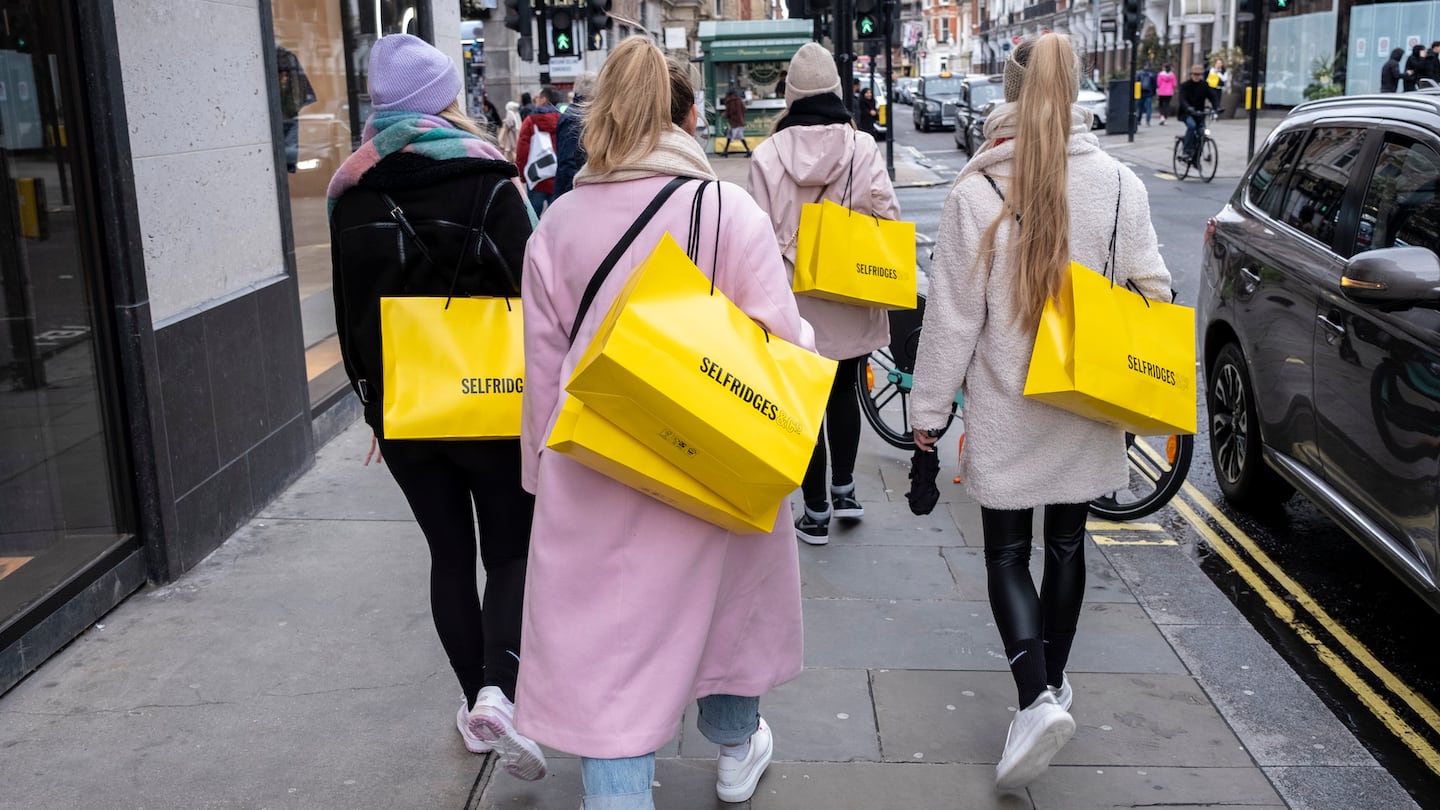
The Business of Fashion
Agenda-setting intelligence, analysis and advice for the global fashion community.

Agenda-setting intelligence, analysis and advice for the global fashion community.

Last December, Tiffanie Darke took an inventory of all the clothes she’d brought over the course of 2022.
Though the former editor-in-chief of London’s Sunday Times Style magazine and brand strategist thought she had been abstemious — an effort to protect both the planet and her wallet — she had in fact bought some 20 new items, including one pair of loafers, three pairs of trainers, three shirts, three jumpers and “a really luxury pair of tracksuit bottoms.”
“I’m feeling a bit shame-faced,” Darke confessed in a video posted to Instagram on New Year’s Eve, before committing to a New Year’s fashion resolution to only buy five new things in 2023 and inviting others to join in.
The idea came from a report published by the Berlin-based think tank Hot or Cool Institute in November, which laid the blame for fashion’s hefty environmental footprint on overconsumption by wealthy shoppers in rich countries. To keep the industry’s greenhouse-gas emissions in check, in line with global efforts to stave off catastrophic levels of climate change, affluent consumers in places like the US, UK and France should be limited to an average of five new items a year, the report found.
ADVERTISEMENT
“It was such a shock and it was so tangible … I’m not a fashion denier at all — it’s glorious. But it turns out it’s also really bad for the world,” said Darke. “[But] five things isn’t denying yourself fashion. Five things is enough.”
Or at least that’s the theory she set out to test this year.
Darke counts among a small but growing niche of people looking to disconnect from the churn of the fashion system.
Financial Times fashion editor Lauren Indvik has also pledged to only buy five new things this year. Fashion advocacy group Remake has launched a campaign to encourage its 155,000 Instagram followers to commit to buy no new clothes for the summer. And on TikTok, some “deinfluencers” are using their platform to urge followers to buy less.
The movement dovetails with a broader shift in the cultural narrative towards less conspicuous consumption, underpinned by growing anxiety about the climate and cost-of-living crises.
“There’s a cohort of consumers now — because it’s definitely not everybody — that feels stuff as an emotional load,” said Allyson Rees, a senior strategist at trend forecasting firm WGSN. For this group, financial pressures and growing awareness of fashion’s environmental and ethical shortfalls have turned once pleasurable impulse buys into a weight. “[There’s] guilt associated with those products now that I don’t think consumers were attuned to, even like three or five years ago,” said Rees.
These “reductionists” are one of four key emerging consumer profiles the trend forecasting agency has identified for brands to focus on ahead of 2025.
But while the conversation is getting louder, the number of people actually changing the way they shop remains small.
ADVERTISEMENT
“It’s a bit of a David and Goliath thing,” said Ayesha Barenblat, founder and chief executive of the advocacy group Remake. “We’re up against the marketing machine of an industry worth $2 trillion.”
When Darke first started her year of five new things, there was something sort of thrilling in the challenge.
She shopped her wardrobe, rediscovering and reworking forgotten gems, like a little-worn Prada dress she altered into a top. She identified gaps and spent months tracking down the perfect white shirt. And she removed temptations, avoiding shop windows and blocking social-media ads.
Then, last month on a work trip to Ibiza, where she co-runs a fashion store focused on responsible brands, she cracked. On an impulse, Darke bought a pair of gold silk cargo pants.
“They’re not practical: I won’t wear them every day,” said Darke. “Sometimes you need something really inappropriate to bring you joy.”
The temptation to shop — even for those highly engaged with the issues created by overconsumption and committed to change their habits — points to the reasons why we keep buying more and more clothes, even as the number of people who say they care about fashion’s environmental impact grows.
“We want to shop,” said Carolyn Mair, a fashion business consultant and author of “The Psychology of Fashion.” “Buying something new gives us a sense of high. We get dopamine from the hunt. We feel we look good in what we’re wearing. So regardless of the cost or consequences of making that purchase, it makes us feel good.”
Humans are hardwired to crave newness and the sense of social status and security that has long been linked to dress.
ADVERTISEMENT
For its part, the fashion industry has honed its marketing tactics to capitalise on these deep-rooted emotions and turned shopping into a form of entertainment, turbocharged by the rise of social media and ultra-cheap, ultra-fast e-commerce.
“The availability is just constant; you don’t need to have a trip to the high street, it’s in your hand 24/7,” said Mair. “That is tempting for us. When we see it, we want it. If we don’t see it, we want it less.”
Companies like Shein have ratcheted the model up even further, gamifying shopping with flash sales and pop ups that add a sense of urgency to the buying experience and making fashion faster, cheaper and more compulsive.
“One of the reasons consumption has gotten so much worse is that you have FOMO all the time in your ear,” said Rees. Even in a cost of living crisis, a new $20 dress can be seen as a treat, not a luxury — especially if it’s bought on sale.
Calls to buy less, by contrast, can feel preachy and elitist. Options put forward as more responsible, like buying better quality items that last longer, shopping secondhand or mending damaged clothes, require upfront investment, time and effort. Meanwhile, brands have done their best to entice concerned consumers to keep shopping with collections made from recycled plastics or vegan leathers — and often priced at a premium.
“There’s definitely some privilege associated with this,” said Rees. “Basically what you’re saying is that you already have what you need, so you can just choose what you buy. But a lot of people don’t have what they need.”
Sustainable fashion advocates acknowledge the challenges and want to find ways to make buying less more accessible and appealing.
“Behaviour change doesn’t happen by telling people what to do and making them feel bad,” said Mair. “Saving the planet is a huge, amazing thing … [but you] have to show what’s in it for me as a consumer.”
For instance, this year Remake is flagging how much money its community can save by committing to its 90-day shopping detox, as well as the water use and carbon emissions they’ll avoid. It’s also encouraging people to participate in a way that works for them, whether that’s going fully cold turkey, limiting purchases to secondhand items or carving out exceptions for special occasions or necessities. And it’s trying to make it fun, with swapping events and meet-ups.
“We want to do away with just reaching the die-hards to being more mainstream,” said Barenblat. “What we’re trying to offer is that we’re not taking one more thing away. We’re giving you something so much cooler than that limited thrill from a $10 dress.”
For more BoF sustainability coverage, sign up now for our Weekly Sustainability Briefing by Sarah Kent.
Calling out the industry’s environmental footprint and the true cost of making clothes has touched off a complex and heated debate about the accessibility and affordability of lower-impact fashion.
The EU parliament has backed recommendations to toughen proposed measures to tackle the excessive production and consumption of fashion.

Sarah Kent is Chief Sustainability Correspondent at The Business of Fashion. She is based in London and drives BoF's coverage of critical environmental and labour issues.
The fashion industry continues to advance voluntary and unlikely solutions to its plastic problem. Only higher prices will flip the script, writes Kenneth P. Pucker.
The outerwear company is set to start selling wetsuits made in part by harvesting materials from old ones.
Companies like Hermès, Kering and LVMH say they have spent millions to ensure they are sourcing crocodile and snakeskin leathers responsibly. But critics say incidents like the recent smuggling conviction of designer Nancy Gonzalez show loopholes persist despite tightening controls.
Europe’s Parliament has signed off rules that will make brands more accountable for what happens in their supply chains, ban products made with forced labour and set new environmental standards for the design and disposal of products.